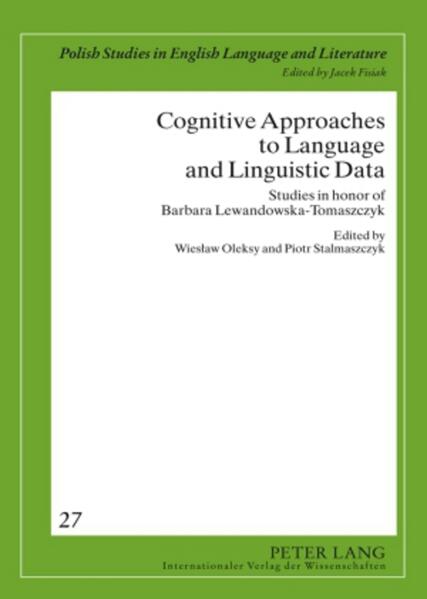
Zustellung: Do, 12.06. - Mo, 16.06.
Versand in 1-2 Wochen
VersandkostenfreiBestellen & in Filiale abholen:
The volume presents over 30 contributions by leading European and American linguists presented to Professor Barbara Lewandowska-Tomaszczyk, an eminent Polish linguist, in recognition of her contribution to the science of language. Papers contained in the volume reflect the many ways in which cognitive linguistics has affected such areas of linguistic research as: semantics, pragmatics, discourse analysis, applied linguistics, and corpus and computer linguistics. A number of contributors, including R. Langacker, deal with current issues and developments in cognitive linguistics.
Inhaltsverzeichnis
Contents: Piotr Stalmaszczyk/Wies aw Oleksy: Barbara Lewandowska-Tomaszczyk s research output Antonio Barcelona: Social clubs or sticks? Metonymic chaining in discourse Eugene H. Casad: Much ado about nothing in Cora Dirk Geeraerts: Prisms and blends. `Digging one s grave from two perspectives Laura A. Janda: «What is the role of semantic maps in cognitive linguistics?» Roman Kalisz: Nothing and nothingness in English and their equivalents in Polish and other languages. A cognitive semantic study Henryk Kardela: The case of smart: semantic underdeterminacy, or how words get their meanings from context Ronald W. Langacker: On AND and OR and OR as AND Aleksander Szwedek: Are prepositions metaphorical? Piotr Cap: Legitimization of the War-on-Terror within the proximization model Kenneth Holmqvist/Jaros aw P uciennik: Empathy, stereotypes, negation and creativity. Towards a linguistic model of intersubjectivity Katarzyna M. Jaszczolt: Where cognitive and truth-conditional semantics meet: the case of concept shift Alexander V. Kravchenko: Speech, writing, and cognition: the rise of communicative dysfunction Jean-Rémi Lapaire: The meaning of meaningless grams - or emptiness revisited Danilo Marcondes: Towards a pragmatic analysis of language: Speech Act Theory and Critical Philosophy Miguel A. Martínez-Cabeza: Dangerous words: threats, perlocutions and strategic actions Daniël Van Olmen/Tanja Mortelmans/Johan van der Auwera: Grammaticalization and subjectification of the future. The case of English, Dutch and German Larisa Piotrovskaya: Description, expression and reflection of emotions in language behaviour Marcel Thelen: The structure of the lexicon in a «Two-Cycle Model of Grammar» (TCM): prototypicality and frames Olena I. Vashchenko: Cognitive-semantic aspects of metaphorical lexical/phraseological nominations of lying/deception in the present-day English language Andrew Wilson: Barrier and penetration imagery in altered states of consciousness discourse: replicating the five-stage model of Christian mysticism in the Bible ukasz Bogucki: Translating and subtitling wordplay - between domestication and foreignisation Sally Burgess/Carmen Toledano: Explicitation in the collaborative translation into Spanish of two modern American poets El bieta Tabakowska: Enjambment, conceptual blending and translation of poetry Zdzis aw W sik: Epistemological consequences of translating the sign-related terms of Ferdinand de Saussure s Cours de Linguistique générale Lut Baten/Michael Goethals: Lexical frequency as a criterion and a tool in teaching and learning ESP: On the use of WordClassifier, more specifically for Business English Michael P. Oakes: Computer-aided discovery of regular sound changes in Spanish and Galician Rosa Rabadán: The present tenses in English and in Spanish: a corpus-based approach to cross-linguistic meaning and grammatical transfer Christoph Haase: Causation in contrast: transitivity, inchoativity, and L2 learner models Ewa Waniek-Klimczak: Category implementation in non-native speech: the case of aspirated plosives in Polish-English bilinguals.
Produktdetails
Erscheinungsdatum
16. Februar 2009
Sprache
englisch
Seitenanzahl
528
Reihe
Crossroads and Interfaces: Studies in Linguistics and Literature
Herausgegeben von
Wieslaw Oleksy, Piotr Stalmaszczyk
Verlag/Hersteller
Produktart
gebunden
Gewicht
767 g
Größe (L/B/H)
32/148/210 mm
ISBN
9783631588611
Entdecken Sie mehr
Bewertungen
0 Bewertungen
Es wurden noch keine Bewertungen abgegeben. Schreiben Sie die erste Bewertung zu "Cognitive Approaches to Language and Linguistic Data" und helfen Sie damit anderen bei der Kaufentscheidung.









